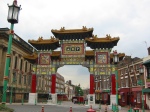11 February
2011
Is Multiculturalism Dead?
Trying to define multiculturalism is rather like trying to pin tomato seeds down on a plate. So it was with some interest that I listened to David Cameron’s much heralded Munich speech in which he argued that ‘the doctrine of state multiculturalism’ had failed, and that Britain needs to foster a stronger sense of shared national identity to prevent young people from turning to Islamic extremism. Perhaps, I wondered, now that multiculturalism is dead, he would go on to tell us what it was all about in the first place. I was to be disappointed.
It may be worth considering what the word ‘culture’ means. The Oxford English Dictionary defines it as the ‘distinctive ideas, customs, social behaviour, products, or way of life of a particular society’. Even this definition is somewhat lacking. The word originates from the Latin colere, which refers to tilling of the soil and nurturing of plants. This suggests human culture must be grasped at a level deeper than that of a collection of shared customs. It amounts to a mindset, a way of engaging with the world, which is engendered by the collective influence of customs, beliefs, and traditions on the psyche of persons and peoples. Like the process of cultivating the soil or nurturing plants, which alters the things in question, the influence of culture on man is deep and inescapable.
The problem with multiculturalism, I would suggest, is that it is not multiculturalism, or indeed to do with culturalism at all. It is, rather, symptomatic of a lack of culture. This is perhaps most graphically illustrated by champagne-quaffing middle-class folk who see ‘culture’ as a product to be consumed rather than as a living tradition which in which we should be immersed and by which we should be formed, cultivated, and nurtured. In this view, a man is cultured not because he has been refined in the furnace of a particular culture, but because his shelves are bulging with various nick-knacks from exotic locations – ‘a little bit of this and a little of that’. Such a banalisation of culture is then logically extended to one’s native culture which ceases to be a habitat and becomes instead one product among many available for consumption. The individual’s autonomy in picking and choosing from the platter is all that matters.
It is hardly surprising that such a childish and materialistic notion of culture should prove incapable of providing the glue to bind society together. The problem is not so much – as the Prime Minister seems to suggest – that Muslims or ethnic minorities live isolated in separate communities. Ethnic minorities have always tended to form their own communities in order to preserve their way of life. To an extent this is justifiable, and it would be wrong to insist on a process of cultural assimilation under the guise of ‘integration’. The real problem is that the vast majority of native Britons, who are neither Muslims nor members of ethnic minorities, have abandoned their traditional culture and the religion upon which it is based, so that the country as a whole has become like a car without a driver at the wheel.
David Camerons’s proposed cure may prove worse than the disease he has diagnosed. In place of multiculturalism, we are now offered a sinister form of ‘muscular liberalism’. ‘Freedom of speech. Freedom of worship. Democracy. The rule of law. Equal rights, regardless of race, sex or sexuality’… ‘[A truly liberal society] says to its citizens: this is what defines us as a society. To belong here is to believe these things’, said Cameron. The proposal may not be wholly objectionable, but can a society survive if all it has to show for over a thousand years of religious and cultural development is the vacuity of concepts like ‘equal rights regardless of race, sex or sexuality’?
In reality, Cameron’s speech contained little that was new. In 2007 Gordon Brown’s Government published a green paper on The Governance of Britain which proposed ‘to work with the public to develop a British statement of values’, as if publishing a list of slogans like ‘fair-play’ and ‘tolerance’ could fill the enormous vacuum created by the collapse of culture in modern Britain. There is an ominous feel to this attempt to draw up a centrally-mandated notion of ‘Britishness’. No doubt such projects will begin by targeting young Muslims in danger of ‘radicalisation’, but how long will it be before anyone who takes issue with the new State index of compulsory British values falls foul of the new ‘muscular liberal’ establishment?
David Cameron spoke of how the young are drawn to Islamic extremism because it provides them with ‘a sense of community . . . [which] the wider society has failed to supply’. This is clearly true, but it is much less clear whether such a sense of community can be provided by State schemes promoting the liberal values dear to David Cameron and the Notting Hill set with whom he is surrounded. We must ask ourselves, more seriously, why a sense of community, of belonging, is lacking in the first place. It is not surprising that a society which has defined itself by the vague ideals outlined by the Prime Minister has become atomised, with communities and individuals increasingly separated from each other. What is to be expected if we choose, as our highest national ideal, not the pursuit of what is true and good, but of managed moral anarchy – an unlimited freedom to do and say as we please without fear of external restraint? The solution lies not in state promotion of muscular liberalism, or any other fly-by-night ideology, but in grass-roots rediscovery of traditional British and Judaeo-Christian values.
(Photo of David Cameron: © Department for Business, Innovation, and Skills. Photo of Chinatown: © Eric Newth. Some rights reserved. No endorsement implied.)


Leave a Reply